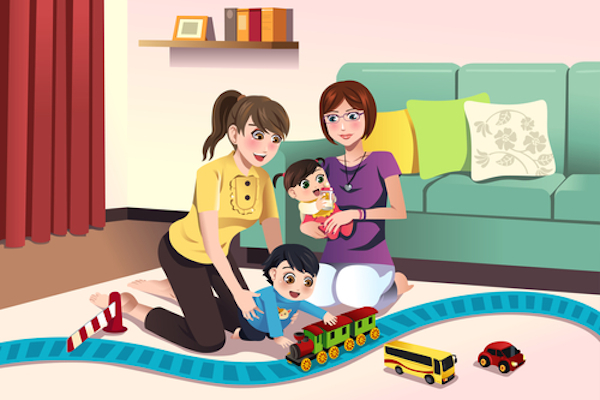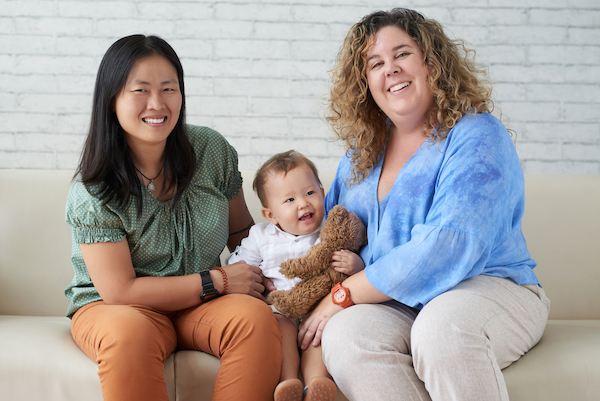
I’ve Got Danny Issues: Why I’m Not Seeing Stonewall
August 14, 2015
Missouri Court of Appeals Allows Lesbian Mother to Seek Custody
August 18, 2015Marriage equality is the law of the land! On June 26, 2015, the United States Supreme Court determined that every U.S. state must recognize and perform same-sex marriages, and couples around the country began to receive the benefits and responsibilities of legally-recognized marriages in their home states. For couples raising children or planning to do so, this new development raises questions about how marriage equality affects them as parents: does marriage equality automatically make them both legal parents to their children? Does it provide additional opportunities to them, such as adoption or getting other court orders? If a couple had married in a jurisdiction that recognized their marriage prior to this ruling, would states which had not previously recognized their marriage count them as married from that prior date, or from the date that state began to recognize their marriage? Would it matter when their children were born or adopted?
Unfortunately, the answers to these questions are not clear, as marriage equality does not automatically update laws regarding parentage. It may be tempting for same-sex couples to rely on a legal principle called the “marital presumption,” which says that one spouse is presumptively a parent to a child born to the other spouse, as long as the parties were married at the time of the child’s birth. Most states have some version of the marital presumption. In theory, this could mean that two women, married to one another, could have one spouse give birth, and that that child would be the presumptive legal child of both women.
However, there are significant problems with relying solely on the marital presumption to prove parentage, even as all states are required to recognize a couple’s marriage. For one thing, every state has slightly different laws, and many have not yet updated the language of their statutes (including marital presumption statutes) to reflect the fact that same-sex couples may now marry in that state. As a result, judges may still strictly apply the language of these statutes, which are often written only to include heterosexual marriages. Additionally, it is not yet clear at which point the marital presumption attaches. In some states, a couple who was married in Massachusetts (where it was legal) before having their children may be afforded the presumption, but in other states, a court may determine that the same couple’s marriage didn’t legally begin until June of this year (when the U.S. Supreme Court issued its decision), and therefore not until after their children were born. Although both spouses may be listed on a child’s birth certificate, birth certificates do not provide legal parentage. Discrepancies and uncertainties like this make relying on the marital presumption risky at best, even if it were undisputed that the marital presumption applied to same-sex couples and opposite-sex couples equally.
Courts have already begun to apply the marital presumption differently in this regard. Just recently, a New York court refused to apply the marital presumption to a same-sex couple who had been legally married in New York State, even though it would have applied to a heterosexual couple. In this case, two women had decided to have a child together through artificial insemination, were married at the time of the child’s birth, and raised him together for the first year and a half of his life before filing for divorce. However, the judge determined that the non-biological mother had no standing to seek custody of the child upon the couple’s divorce because she could not have been his biological parent, due to the fact that same-sex couples cannot biologically have children together. In Wisconsin, state officials similarly refused to list two married women as parents on their child’s birth certificate in Wisconsin, stating that the marital presumption did not apply to two married women. These troubling decisions demonstrate that the law is still unsettled in this area, and even same-sex couples who were married when their children were born may not both be considered legal parents to their children.
In order to absolutely ensure that both spouses will have the rights and responsibilities of legal parentage for their children, same-sex married couples should seek a court order definitively stating that both of them are legal parents. One way to obtain such an order is through a step-parent or second-parent adoption, in which the non-birth spouse adopts the child without terminating the birth spouse’s parental rights. Another way, which has only been minimally tested but has so far been successful in some jurisdictions, is through petitioning a court for a Judgment of Parentage, in which a court simply recognizes that the marital presumption applies and memorializes this in an official judgment, to which other jurisdictions must give full faith and credit. To determine the best method of ensuring legal parentage for both spouses, couples in this situation should contact a family law attorney in their area.
Michele Zavos is a partner in the Zavos Juncker Law Group, PLLC, which practices family law in the District of Columbia, Maryland, and Virginia. Cody M. Perkins is an associate and legal fellow with the firm.





